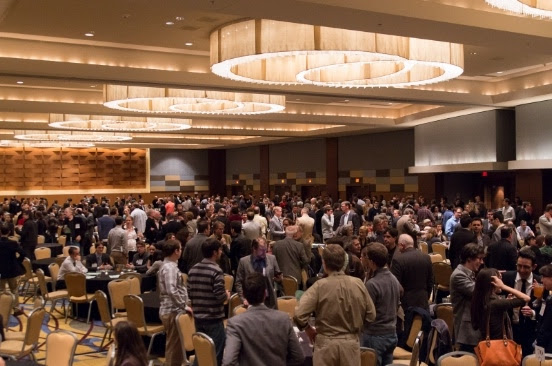APP Editors’ Note: V is a full professor of philosophy at a research university, with some 30 years of experience –and membership in the APA.

I was wandering through the mall. Not because I wanted to, but once in a while, these days, one needs something that just happens to be at a store that just happens to be in a mall.
No one goes to the mall much any more. Many have been closed and still more have been re-infested with tax advisors and health centers and other transient services that need space. There are a few sad stores. And of course, old people still do their laps. The mall has become a sort of park for the forgotten and over-specialized.
It’s like going to an APA meeting, I realized.

No one goes who doesn’t have some pretty pressing reason to go, and strolling down the hall, peeking in this door or that, one sees various uncomfortable people dispensing theory, and the like, to the three or four who came through the doors for some very particular reason.
In here is a fellow reading about meta-ethics, and over there someone is defending yet another version of compatabilism or reliabilism or intuitionism or rheumatism.
Oh, and look, here, in this nearly empty chamber! This is like the pet store in the mall that only has gerbils!
Here, in this tiny, out-of-the-way corner of the city, you can get Gettier proofs. (Who would have thought they’d still be going?) There are old people doing laps, here, too. Everything they believe is justified and true, so they pass by on the other side of the pet store.
It was not always so. When I was a kid, my city had no malls. It had plenty of places to shop, of course. You could get anything you wanted and you knew where to get it and the person who could get it for you.
Then came the first mall. It seemed not only sensible, at the time, but a glorious modern convenience. Here at one end was the grocery store, and in the middle the drug store, and at the other end, Sears(!), where you could get your car fixed and your furniture and appliances and your new shoes and some perfume for Mother. All of it was under one (somewhat over-extended) roof.
We came. We saw. We purchased. And, bit by bit, the world of druggists who knew our health and shoe stores that retained our sizes, and florists who knew our anniversaries was swallowed into an impersonal mass that neither knew nor could know what we needed or wanted.
And, at length, we didn’t go any more.
You are intelligent people. I don’t have to fill out this analogy for you.
But I know you don’t go. And I don’t go. And we are no longer a connected community.
We are now, as with the fate of the mall, an on-line virtual community that is vaguely familiar with the fact that its members exist elsewhere. We order what we need from the drop-down menu, elsewhere. We don’t see one another except in our special interest groups, where we can be assured that everyone already agrees with the assumptions we bring to the meeting, and then all of us depart for elsewhere. We have no shared purpose.
We also do not want one, and so we do not seek one. We have become true professionals, which is to say auto-liberated droplets in an information deluge that cares not a whit about what we are contributing to our here, since even our students are, increasingly, elsewhere.
Back before the mall came, we did see ourselves as members of a community, as part of a here, as educators, as interlocutors, as something more than sophists-on-line.
But the world changed, indeed, it changed more than once. There was the time the mall came, and was here, and then there was the time we stopped going there and started to acquire, and to be acquired, on-line. And then our young people noticed what we were doing and they did it too. But they don’t remember the time before the mall came to town.
They think this dehumanized world of elsewhere is THE world –they think this dehumanized “profession” is philosophy.
Shall we set them on our knee and tell them tales of when it was not so, of when there was a here? Or should we rather change our own behavior and show them there was philosophy, once, and could be again?
There was a time when we knew we had to visit all the shops in town and learn what and who was in them. And, having done so over many years, we knew them and could relate to an Eleatic stranger what it was to be somewhere rather than elsewhere.
I am afraid that we can teach nothing now, or at least nothing worth knowing, to those who don’t remember the time before the mall came. We have forgotten how. Yet, I think it isn’t hopeless. Philosophy has a way of persisting in back alleys and back yards.
But I, for one, would like to see the city fathers rebuild the plaza they so stupidly paved over, so we could park at the mall.
